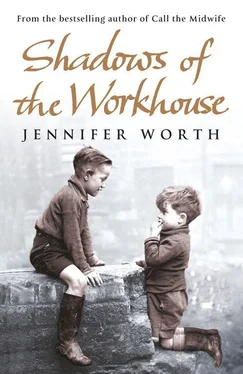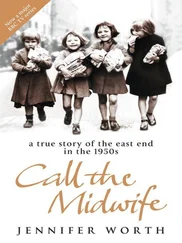Jennifer Worth - Shadows Of The Workhouse - The Drama Of Life In Postwar London
Здесь есть возможность читать онлайн «Jennifer Worth - Shadows Of The Workhouse - The Drama Of Life In Postwar London» весь текст электронной книги совершенно бесплатно (целиком полную версию без сокращений). В некоторых случаях можно слушать аудио, скачать через торрент в формате fb2 и присутствует краткое содержание. Жанр: Биографии и Мемуары, на английском языке. Описание произведения, (предисловие) а так же отзывы посетителей доступны на портале библиотеки ЛибКат.
- Название:Shadows Of The Workhouse: The Drama Of Life In Postwar London
- Автор:
- Жанр:
- Год:неизвестен
- ISBN:нет данных
- Рейтинг книги:5 / 5. Голосов: 1
-
Избранное:Добавить в избранное
- Отзывы:
-
Ваша оценка:
- 100
- 1
- 2
- 3
- 4
- 5
Shadows Of The Workhouse: The Drama Of Life In Postwar London: краткое содержание, описание и аннотация
Предлагаем к чтению аннотацию, описание, краткое содержание или предисловие (зависит от того, что написал сам автор книги «Shadows Of The Workhouse: The Drama Of Life In Postwar London»). Если вы не нашли необходимую информацию о книге — напишите в комментариях, мы постараемся отыскать её.
Shadows Of The Workhouse: The Drama Of Life In Postwar London — читать онлайн бесплатно полную книгу (весь текст) целиком
Ниже представлен текст книги, разбитый по страницам. Система сохранения места последней прочитанной страницы, позволяет с удобством читать онлайн бесплатно книгу «Shadows Of The Workhouse: The Drama Of Life In Postwar London», без необходимости каждый раз заново искать на чём Вы остановились. Поставьте закладку, и сможете в любой момент перейти на страницу, на которой закончили чтение.
Интервал:
Закладка:
“A few weeks. Perhaps a month. No longer. It’s all very sudden.”
It was indeed sudden. The sound of children playing was the first thing to go. Flats were vacated, and removal men were in and out of the courtyards; windows were boarded up; the stairways were left dirty and increasingly derelict; dustbins rolled across the cobbles. The constant hum of human activity was replaced by empty echoes as the courts picked up the sound of a single voice and threw it backwards and forwards, till it fell silent in the still air.
I wondered how much more I would see of Mr Collett. If he was going miles away to the countryside of Hertfordshire or Essex, how often would I be able to visit him? Our cosy evenings of sherry and chocolates and chats seemed to be coming to an end.
I popped in on him about a week later to ask if he had come to a decision. He had.
“I’m going to St Mark’s in Mile End,” he said. “When I was young, it used to be a workhouse. But that was a long time ago. Now it is a residential home for old codgers like myself. I think it will be for the best. The lady social worker tells me I will be well looked after. I’m going next week.”
I was shocked and alarmed by the news. The shadow of the workhouse had darkened the lives of countless people for more than a century. Although officially closed in 1930 by Acts of Parliament, workhouses had merely lingered on under another name. I feared for Mr Collett, but I did not like to express my doubts, or even to sound negative, so I simply said: “I’ll come and see you, I promise.”
Back at Nonnatus House, I poured out my misgivings to Sister Julienne. She was thoughtful and looked grave, but said: “You must understand that this is his decision. He is intelligent, and I think he probably realises that he will not be able to manage to look after himself, alone, in a new place.”
I was young and passionate, and argued the case. “But he’s so much better now. He can get around without any trouble. Although his eyesight is dim, he’s not blind, and he can find everything he needs.”
Sister Julienne smiled her sweet, beautiful smile. “Yes, my dear, I know, but that is only because he knows where everything is, and habit makes it possible for him to continue living alone. In other surroundings he would be lost. It is the same for most old people.”
My unease persisted, but I knew there was nothing I could do.
A few days later, when I was in the area, I thought I would pop in to arrange a final evening with my old friend. To my astonishment, the flat was empty. I peered through the curtainless window. Everything was the same – but different. Inanimate objects have a life of their own, especially when they are the daily companions of a living soul. Without that life, they take on a bleak, desolate appearance, like furniture piled up in a warehouse. I knew he was gone, and didn’t need anyone to confirm it, although the woman next door stepped out, or rather shuffled out. Gone was her self-righteous aggression; gone, her busy-body ways and manners. Instead she exuded a dull, helpless apathy and despair. Her voice was subdued. ’E’s gorn. Vey took ’im vis mornin’ wiv ’is case. Vey’ll take me an’ all, vey will.” She shuffled back into her flat, and bolted the door. Poplar people never bolted their doors in daytime, unless they were afraid of someone.
At Nonnatus House, I felt a heavy sense of loss as I climbed the stairs. It had all been so sudden. My first thought was to go and see him at once, but then I dithered around, thinking that he needed time to settle in and get to know other people. Perhaps it was all for the best. If a thing has to be, it’s best to do it quickly. He was a wise old man; he would not have agreed to go so soon if he had thought there was anything to be gained by delay.
It was about a fortnight later, after lunch, when I cycled up to Mile End to find St Mark’s. I entered by the huge iron gate, and looked at the bleak grey buildings. I was accustomed to the old workhouse buildings, because most of them had been converted into hospitals or isolation units. I knew that they all had a particularly grim appearance, but I had never seen anything as forbidding as St Mark’s. My heart sank as I looked around.
I enquired after Mr Collett. Perhaps I had imagined that some helpful, pretty young nurse in a natty little uniform would take me straight to him. Not so. The only person I saw was a rather dirty-looking porter pushing a trolley of bins. He spoke no English, but pointed to a door. Inside was a sort of office area with no one around. It was cold and high-ceilinged, with plaster cracking and crumbling off the walls. I called, and my voice echoed up the stairwell. Still no one came.
I wandered out, and through another door. A wide, empty corridor stretched ahead, with doors going off it. I opened one, and entered a large, square room, where a lot of old men were sitting around Formica-topped tables. For a room so full of humanity it was eerily quiet. Faces looked up at me, all blank and expressionless. I looked round, but could not see Mr Collett. Nor could I see anyone to ask about him. Some plates rattled, which indicated a kitchen, and I went towards the sound. Two young men were inside, but neither of them spoke English. They repeated the name “Collett” several times, but shook their heads. One of them indicated another building. I followed the advice, and was fortunate to meet a porter, who said, “You need Reception, dear, over there,” pointing to the first door I had entered.
Back in the hall with the echoing stairwell I hung around, and “hello-ed” for about twenty minutes. Eventually a middle-aged man entered, carrying a sheaf of papers. I gave him my request.
He looked at me in astonishment. “You want to see a Mr Collett? Is that what you are saying?”
“Yes.”
“Why? Are you a social worker?”
“No. I just want to see him. Have I come at the wrong time, then? Am I out of visiting hours?”
“No. We don’t have any visiting hours. We generally don’t get any visitors. I’ll have to open the office and find out where this Mr Collett is.”
In the office, he thumbed through piles of papers. “I think I’ve found him. Mr Joseph Collett. Is that the name you want? Block E, Fifth Floor. Go up that staircase you see opposite.”
He pointed to a stone staircase. I climbed five flights and pushed open the heavy door, entering a room similar to the one I had seen on the ground floor. It was large, with about twenty Formica-topped tables and four hard-backed chairs at each table. Old men were sitting on most of the chairs, their arms on the table, staring at the man opposite. Some had their heads down, resting on their arms. No one spoke. The room smelt acrid with urine and body odour. The high windows let in light, but they were too high for anyone to see out.
I looked around until I saw Mr Collett at the far end of the room. He was looking down at the table at which he was sitting, and did not see me approach. I went straight up to him and kissed him.
He gasped, looked up, and tears filled his eyes. His lips trembled, and the tears fell. He whispered, “My maiden, my Jenny, you’ve come, then.” He was too overwhelmed to say anything more.
The chair opposite was empty, so I sat down and we held hands across the table.
“I would have come sooner, only I thought you should have a chance to settle in, and get to know your companions. I’m so sorry if you thought I wasn’t coming.”
He muttered, “Yes . . . no . . . I mean, that’s all right, my pet, that’s all right. You’re here, and I love you for it. I’m so grateful.” He squeezed my hand.
I bit my lip, close to tears myself, and looked round at the cheerless room, filled with lethargic old men saying nothing. I didn’t know what to say myself. We had never had any difficulty with conversation before; in fact, time had always seemed too short for all that we had to say. But now I was tongue-tied. I asked empty questions like: “Are you all right, then?” “What’s the food like?” “Are you comfortable here?” to all of which he replied, bleakly, “Yes, I’m doing very nicely, thank you. You don’t want to worry your head about me.”
Читать дальшеИнтервал:
Закладка:
Похожие книги на «Shadows Of The Workhouse: The Drama Of Life In Postwar London»
Представляем Вашему вниманию похожие книги на «Shadows Of The Workhouse: The Drama Of Life In Postwar London» списком для выбора. Мы отобрали схожую по названию и смыслу литературу в надежде предоставить читателям больше вариантов отыскать новые, интересные, ещё непрочитанные произведения.
Обсуждение, отзывы о книге «Shadows Of The Workhouse: The Drama Of Life In Postwar London» и просто собственные мнения читателей. Оставьте ваши комментарии, напишите, что Вы думаете о произведении, его смысле или главных героях. Укажите что конкретно понравилось, а что нет, и почему Вы так считаете.






![Theresa Cheung - The Dream Dictionary from A to Z [Revised edition] - The Ultimate A–Z to Interpret the Secrets of Your Dreams](/books/692092/theresa-cheung-the-dream-dictionary-from-a-to-z-r-thumb.webp)





